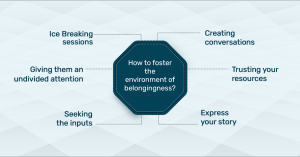Humans always have the urge to feel belonged. Belongingness to the place they live, stay at home. Belongingness to the place they work, say office and belongingness in the overall society they live, that is the greater community. We can say that it all boils down to one common attribute which is social connection, being one of our most basic needs. It is studied that when this need is not met, it may cause pain in both physical and psychological forms in the same way as one would feel if deprived with the basic needs like water, food, and shelter.
Additionally, when one has that sense of belonging and feels a sense of inclusion in the team, it does contribute towards productivity. The feel of being a part of something bigger than ourselves creates a sense of belongingness. Hence, for many employees, belongingness and attachment with their co-workers is a much greater motivator as compared with money and contributes big time in creating employee retention.
How can you foster the environment of belongingness
Ice Breaking sessions
During the first 30 initial days, when an employee is hired, it is extremely important to foster relationships among the team members and the organization. It is advisable to introduce the new team member at a very personal level. Experts recommend using the language of belonging by emphasising on the word “our”, e.g., “This is Tanaya and is now a part of our marketing team”. Every team is built upon a strong foundation of trust. Many times, people don’t feel comfortable talking about how they’re feeling or what they are going through at work. Studies say that nearly 60 percent of employees have never spoken to anybody at work about their mental health status, which needs to be taken care of.
Creating conversations
Listening is an extremely important leadership tool which one should hone. In order to set the tone for the team, leaders should model vulnerability and authenticity. Doing things as simple as talking about what improvements were needed in their own initiatives and what they understood for the betterment going ahead. It also means being honest and supportive while they’re struggling at work. By expressing our own human flaws, we empower others to take calculated risks without the fear of failure.
Seeking the inputs
Including people in meetings and genuinely valuing their opinion and feedback is an essential way to create the sense of belongingness. Additionally, listening to their ideas is important too. Employees play a critical role in fostering an inclusive environment. If the company rolls out an employee survey each year, it could be a good point to include the question: “As a team, what can we do to improve our sense of belonging and inclusion at work?” With questions like this would help in deep dive to understand the employee’s outlook towards the organisation and enable to pinpoint the opportunities and scope for improvement.
Trusting your resources
Delegating employees with important tasks reflects that the manager trusts them to get the job done and can foster strong collaboration both inter-team and intra-team. Google conducted a two-year research to figure out the essentials to have a successful team. Based on the results it could conclude that the most important component is psychological safety. This stems from the knowledge implying that employees can take risks without feeling insecure or embarrassed if they don’t succeed as expected. Managers should be encouraged to call employees who are trying to speak up but are unable to find the right words to express. Also, if they notice that certain team members never speak up in meetings, the managers should consider checking in with them on a 1:1 basis to ask how they can be better included in the conversation.
Giving them an undivided attention
Managers should always show respect by fully engaging in whatever their colleague or subordinate has to say. While the discussion is one, the manager should put their phone down and make eye contact with the speaker. They should also encourage inclusion at a project level by asking the team members for their inputs. Instead of simply delegating each employee with a dedicated role in the project, managers should explain the key objective and ask how everyone would like to contribute. This empowers them to decide the role they would like to play at the individual level and makes them more personally invested in the outcome.
Express your story
It is important to know that both mentorship and professional relationships can make or break a career. One should help the other by sharing their own journey and listening to theirs. This way you’ll get a chance to share your successes and failures and also get to hear another person’s diversity of experience. The conversation can allow people who have worked in long-term job roles to re-write their job descriptions, based on how they think they can best contribute to the company’s overarching objectives and goals.
Chapter247 creates the sense of Belongingness
 Chapter247 with its highly devoted and understanding team of managers ensures to create the sense of belongingness at the workplace. The organisation understands that by putting forth a little effort towards the emotional and psychological angle, the team can feel a sense of belongingness. Additionally, the entire organization gets benefitted as people experience greater degrees of respect, collaboration, enjoyment, and productivity at work. In short, it leaves no stone unturned to create a highly social, happy and harmonic workplace for high productivity and contended employees. Interested in joining us? Click here!
Chapter247 with its highly devoted and understanding team of managers ensures to create the sense of belongingness at the workplace. The organisation understands that by putting forth a little effort towards the emotional and psychological angle, the team can feel a sense of belongingness. Additionally, the entire organization gets benefitted as people experience greater degrees of respect, collaboration, enjoyment, and productivity at work. In short, it leaves no stone unturned to create a highly social, happy and harmonic workplace for high productivity and contended employees. Interested in joining us? Click here!







